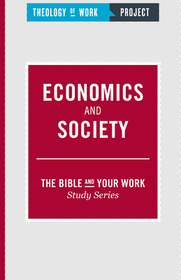Search -
Economics and Society (Bible and Your Work Study)
Economics and Society - Bible and Your Work Study
Author:
A topical study looking at Economics and Society through various biblical texts and Theology of Work articles. How does Christian faith relate to economic life in ways that can potentially advance a more abundant life for all? This study brings a biblical perspective to work and economic life within the overarching mission of fullness of life wo... more »
Author:
A topical study looking at Economics and Society through various biblical texts and Theology of Work articles. How does Christian faith relate to economic life in ways that can potentially advance a more abundant life for all? This study brings a biblical perspective to work and economic life within the overarching mission of fullness of life wo... more »
ISBN-13: 9781619708068
ISBN-10: 161970806X
Publication Date: 7/1/2016
Pages: 79
Rating: ?
ISBN-10: 161970806X
Publication Date: 7/1/2016
Pages: 79
Rating: ?
0 stars, based on 0 rating
Genres:
- Religion & Spirituality >> Worship & Devotion >> General
- Christian Books & Bibles >> Christian Living >> Business & Professional Growth





